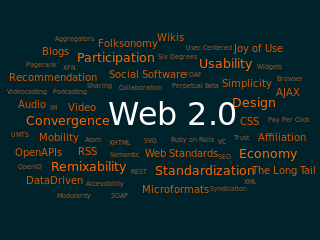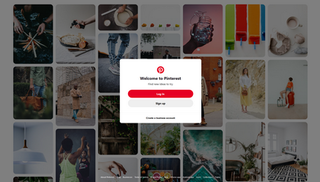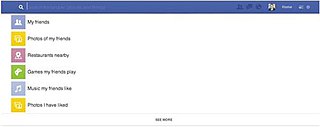Related Research Articles

AOL is an American web portal and online service provider based in New York City. It is a brand marketed by the current incarnation of Yahoo! Inc.

AIM was an instant messaging and presence computer program created by AOL, which used the proprietary OSCAR instant messaging protocol and the TOC protocol to allow registered users to communicate in real time.
Google AdSense is a program run by Google through which website publishers in the Google Network of content sites serve text, images, video, or interactive media advertisements that are targeted to the site content and audience. These advertisements are administered, sorted, and maintained by Google. They can generate revenue on either a per-click or per-impression basis. Google beta-tested a cost-per-action service, but discontinued it in October 2008 in favor of a DoubleClick offering. In Q1 2014, Google earned US$3.4 billion, or 22% of total revenue, through Google AdSense. AdSense is a participant in the AdChoices program, so AdSense ads typically include the triangle-shaped AdChoices icon. This program also operates on HTTP cookies. In 2021, over 38.3 million websites use AdSense.

Myspace is a social networking service based in the United States. Launched on August 1, 2003, the site was the first social network to reach a global audience and had a significant influence on technology, pop culture and music. The site played a critical role in the early growth of companies like YouTube and created a developer platform that launched the successes of Zynga, RockYou and Photobucket, among others. From 2005 to 2009, Myspace was the largest social networking site in the world.

Web 2.0 refers to websites that emphasize user-generated content, ease of use, participatory culture and interoperability for end users.

YouTube is an American online video sharing and social media platform headquartered in San Bruno, California, United States. Accessible worldwide, it was launched on February 14, 2005, by Steve Chen, Chad Hurley, and Jawed Karim. It is owned by Google and is the second most visited website, after Google Search. YouTube has more than 2.5 billion monthly users, who collectively watch more than one billion hours of videos each day. As of May 2019, videos were being uploaded at a rate of more than 500 hours of content per minute.
Naver is a South Korean online platform operated by the Naver Corporation. It was launched in 1999 as the first web portal in South Korea to develop and use its own search engine. It was also the world's first operator to introduce the comprehensive search feature, which compiles search results from various categories and presents them in a single page. Naver has since added a multitude of new services ranging from basic features such as e-mail and news to the world's first online Q&A platform Knowledge iN.
AOL Radio powered by Slacker was an online radio service available in the United States only. It had over 200 free internet radio stations.
Flixster was an American social-networking movie website for discovering new movies, learning about movies, and meeting others with similar tastes in movies, currently owned by parent company Fandango. The formerly independent site, allows users to view movie trailers as well as learn about new and upcoming movies at the box office. It was originally based in San Francisco, California and was founded by Joe Greenstein and Saran Chari on January 20, 2006. It was also the former parent company of Rotten Tomatoes from January 2010 to February 17, 2016. On February 17, 2016, Flixster, including Rotten Tomatoes, was acquired by Fandango.

HubPages is an American user-generated online publishing platform developed by Paul Edmondson that was launched in 2006. HubPages acquired its main competitor, Squidoo, in 2014. In 2018 Seattle-based content company The Maven, Inc. acquired HubPages, and went on to rebrand as The Arena Group in 2021. The company is headquartered in San Francisco.

Bebo was an American social networking website that originally operated from 2005 until its bankruptcy in 2013 and relaunched in February 2021. The site relaunched several times after its bankruptcy with a number of short-lived offerings, including instant messaging and video streaming, until its acquisition by Amazon in July 2019 when it was shut down. It was announced in January 2021 that it would be returning as a new social media site the month after. By May 2022, it had once again been shut down, without having ever left beta testing.
KidZui was a web browser designed for children developed by KidZui, Inc. The KidZui browser used a Zooming User Interface paradigm to make browsing easier for children. Search results appeared as scaled-down images of websites, videos, and pictures that children click on to zoom in and see the content. Children can also browse by category without typing search terms. The KidZui browser did not access the open Internet. KidZui uses teachers and parents to screen content and maintains a database of approved URLs. The KidZui browser could only access URLs in the approved database. Children built avatars called Zuis to represent themselves online. They earned points for web browsing and used points to gain levels and buy clothes and accessories for their Zuis. Children could share KidZui content with friends online. To add a friend online, children needed to know the friends Zui name. There was no online directory of Zui names, so children needed to get their friends Zui names offline in order to add them. Friends also needed to be approved by parents before they become available in the browser. KidZui also tracked children's Internet usage and sends reports to their parents on what their children looked at online.

Patch Media, also known as Patch.com, is an American local news and information platform, based in Manhattan. It is primarily owned by Hale Global. As of January 2022, Patch's more than 100 journalists operated approximately 1,259 hyperlocal news websites, which also have an information component, in 50 U.S. states and Washington, D.C. Patch is operated by Patch Media Corporation.

Quora is a social question-and-answer website and online knowledge market headquartered in Mountain View, California. It was founded on June 25, 2009, and made available to the public on June 21, 2010. Users can collaborate by editing questions and commenting on answers that have been submitted by other users. As of 2020, the website was visited by 300 million users a month.
gutefrage.net is a German question and answer website without topic specialization.
about.me is a personal web hosting service co-founded by Ryan Freitas, Tony Conrad and Tim Young in October 2009. The site offers registered users a simple platform from which to link multiple online identities, relevant external sites, and popular social networking websites such as Facebook, Flickr, and Google+. AOL acquired the site in December 2010. The company remained at AOL for a little over twenty-five months.

Instagram is a photo and video sharing social networking service owned by American company Meta Platforms. The app allows users to upload media that can be edited with filters, be organized by hashtags, and be associated with a location — via geographical tagging. Posts can be shared publicly or with preapproved followers. Users can browse other users' content by tags and locations, view trending content, like photos, and follow other users to add their content to a personal feed.

Pinterest is an American image sharing and social media service designed to enable saving and discovery of information like recipes, home, style, motivation, and inspiration on the internet using images and, on a smaller scale, animated GIFs and videos, in the form of pinboards. The site was created by Ben Silbermann, Paul Sciarra, and Evan Sharp; it had 463 million global monthly active users as of April 2023. It is operated by Pinterest, Inc., based in San Francisco.

Facebook Graph Search was a semantic search engine that Facebook introduced in March 2013. It was designed to give answers to user natural language queries rather than a list of links. The name refers to the social graph nature of Facebook, which maps the relationships among users. The Graph Search feature combined the big data acquired from its over one billion users and external data into a search engine providing user-specific search results. In a presentation headed by Facebook CEO Mark Zuckerberg, it was announced that the Graph Search algorithm finds information from within a user's network of friends. Microsoft's Bing search engine provided additional results. In July it was made available to all users using the U.S. English version of Facebook. After being made less publicly visible starting December 2014, the original Graph Search was almost entirely deprecated in June 2019.
References
- ↑ "Aol Quietly Launches An Expert Site Called Owl, and Feeds It Seed". TechCrunch. 18 January 2010. Retrieved 2021-04-22.[ permanent dead link ]
- 1 2 "Freelance Feb10: AOL launches user-generated sites - and pays". www.londonfreelance.org. Retrieved 2021-04-22.
- ↑ "AOL launches user-generated content websites". www.campaignlive.co.uk. Retrieved 2021-04-22.